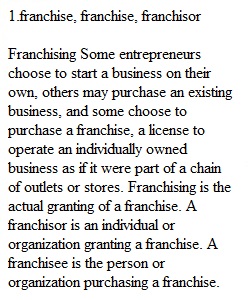


Q Franchising Some entrepreneurs choose to start a business on their own, others may purchase an existing business, and some choose to purchase a franchise, a license to operate an individually owned business as if it were part of a chain of outlets or stores. Franchising is the actual granting of a franchise. A franchisor is an individual or organization granting a franchise. A franchisee is the person or organization purchasing a franchise. The franchisee receives the right to sell the products and use the franchisor’s name as well as trademarks and patents, copyrighted materials, secret methods, and other marketing and management services. In return, the franchisee must pay a franchise fee and royalties, maintain the premises in good condition, train the staff in the franchisor’s methods, and follow any other rules set out by the franchisor. The Growth of Franchising Franchising in the United States was originally used by large firms to distribute their goods. Franchising has increased in popularity since the 1900s. Many service stations, car dealerships, and fast-food restaurants are franchises. More recently, hair salons, tanning parlors, and dentists began participating in franchising arrangements. Franchising has also attracted women and people of color in recent years. More than a quarter of all U.S. franchises are solely owned by women and one third of all franchises are owned by people of color. Types of Franchising There are three types of franchising: 1. A manufacturer authorizes a number of retail stores to sell a certain brand-name item. For example, car dealerships and gas stations. 2. A producer licenses distributors to sell a given product to retailers. For example, Coca-Cola allows distributors to sell its soft drink syrup to restaurants and retail locations. 3. A franchisor supplies brand names, techniques, or other services rather than a complete product. For example, Dunkin’ and McDonald’s fast-food restaurants. Advantages of Franchising Franchise ownership has benefits for both the franchisor and the franchisee. For the franchisor, advantages include expanding the business and bringing in additional revenue without investing their own capital. Through the franchise agreement, the franchisor can ensure that the locations are maintained and operated according to their standards. Additionally, many franchisees are highly motivated to succeed. The success of the franchise means more sales and more royalties for the franchisor. There are a different set of advantages for the franchisee: • Open a proven business with limited capital • Support and training from franchisor • Materials for local marketing and opportunities to participate in national promotional campaigns sponsored by franchisor • Opportunity to purchase supplies and business necessities at discounts The main disadvantage for franchisees is that the franchisor retains a great deal of control. The franchisee will likely have to get approval from the franchisor for any change in décor, menu items, and business operations. A successful franchise may lead to the franchisor opening their own location close by—cannibalizing sales from the franchisee. Unfortunately, disputes over franchise agreements can lead to lawsuits. 1.A ________ is a license to operate an individually owned business as if it were part of a chain of outlets or stores. The ________ is the person or organization purchasing the business, while the ________ is the person or organization granting the right to buy the business. 2.Which of the following is an advantage for the franchisee? 3.Which of the following is an example of a franchise in which a manufacturer authorizes a number of retail stores to sell a certain brand-name item?
View Related Questions